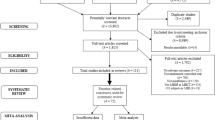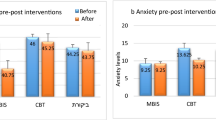Abstract
Objectives
The benefits of mindfulness-based interventions (MBIs) for stress, depression, and anxiety have been shown in various studies. However, only a few studies have investigated the effects of MBI on positive psychological functioning, and even fewer studies have simultaneously studied positively and negatively valenced variables. Nevertheless, the evaluation of both seems indispensable for understanding mindfulness and its effects on psychological health. Therefore, this randomized controlled trial compared the effects of a home-based, 6-week MBI on positive and negative aspects of three psychological variables.
Methods
Eighty-seven participants were randomly assigned to an MBI group (n = 40) or a wait-list control group (n = 47). All participants were evaluated in terms of their positive/negative automatic thoughts, self-compassion levels, and use of cognitive emotion regulation strategies before and after the 6-week period. General linear models were used to compare outcomes on positive and negative scales through likelihood ratio tests.
Results
The MBI group benefited significantly from the intervention. Larger effects of the MBI on positive automatic thoughts (X2(1) = 9.75, p = .001), positive self-compassion (X2(1) = 5.63, p = .02), and “more adaptive” cognitive emotion regulation strategies (X2(1) = 8.99, p = .003) than on their negative counterparts were observed. The effects were moderated by participants’ initial scores for these variables.
Conclusions
The evaluation of MBI outcomes should consistently include positive and negative aspects of psychological health. In addition, the benefits of MBIs depend on participants’ initial scores for the evaluated variables. Therefore, individual differences before the intervention must be considered in evaluations.




Similar content being viewed by others
Data Availability
The dataset generated and analyzed during the current study is available from the corresponding author upon request.
References
Aldao, A., Nolen-Hoeksema, S., & Schweizer, S. (2010). Emotion-regulation strategies across psychopathology: A meta-analytic review. Clinical Psychology Review, 30(2), 217–237. https://doi.org/10.1016/j.cpr.2009.11.004
Antoine, P., Andreotti, E., Congard, A., Dauvier, B., Illy, J., & Poinsot, R. (2018a). A mindfulness-based intervention: Differential effects on affective and processual evolution. Applied Psychology: Health and Well-Being, 10(3). https://doi.org/10.1111/aphw.12137ï
Antoine, P., Dauvier, B., Andreotti, E., & Congard, A. (2018b). Individual differences in the effects of a positive psychology intervention: Applied psychology. Personality and Individual Differences, 122, 140–147. https://doi.org/10.1016/j.paid.2017.10.024
Baer, R. A. (2003). Mindfulness training as a clinical intervention: A conceptual and empirical review. Clinical Psychology: Science and Practice, 10(2), 125–143. https://doi.org/10.1093/clipsy/bpg015
Bishop, S. R., Lau, M., Shapiro, S., Carlson, L., Anderson, N. D., Carmody, J., Segal, Z. V., Abbey, S., Speca, M., Velting, D., & Devins, G. (2004). Mindfulness: A proposed operational definition. Clinical Psychology: Science and Practice, 11(3), 230–241. https://doi.org/10.1093/clipsy/bph077
Bouvard, M., Charles, S., Mollard, E., Guérin, J., Aimard, G., & Cottraux, J. (1992). Etude de validation et analyse factorielle de la version française du questionnaire des pensées automatiques. Journal De Thérapie Comportementale Et Cognitive, 2, 25–28.
Brenner, R. E., Heath, P. J., Vogel, D. L., & Crede, M. (2017). Two is more valid than one: Examining the factor structure of the Self-Compassion Scale (SCS). Article in Journal of Counseling Psychology, 64(6), 696–707. https://doi.org/10.1037/cou0000211.supp
Brockman, R., Ciarrochi, J., Parker, P., & Kashdan, T. (2017). Emotion regulation strategies in daily life: Mindfulness, cognitive reappraisal and emotion suppression. Cognitive Behaviour Therapy, 46(2), 91–113. https://doi.org/10.1080/16506073.2016.1218926
Cavanagh, K., Strauss, C., Cicconi, F., Griffiths, N., Wyper, A., & Jones, F. (2013). A randomised controlled trial of a brief online mindfulness-based intervention. Behaviour Research and Therapy, 51(9), 573–578. https://doi.org/10.1016/j.brat.2013.06.003
Congard, A., Le Vigouroux, S., Andreotti, E., Dauvier, B., Illy, J., Poinsot, R., & Antoine, P. (2019). Time evolution of affective processes in a mindfulness-based intervention. Current Psychology, 41, 126–134. https://doi.org/10.1007/s12144-019-00548-8
De Vibe, M., Solhaug, I., Rosenvinge, J. H., Tyssen, R., Hanley, A., & Garland, E. (2018). Six-year positive effects of a mindfulness-based intervention on mindfulness, coping and well-being in medical and psychology students; Results from a randomized controlled trial. PLoS ONE, 13(4), 1–17. https://doi.org/10.1371/journal.pone.0196053
Diener, E. (1984). Subjective well-Being. Psychological Bulletin, 95(3), 542–575.
Diener, E., Wirtz, D., Biswas-Diener, R., Tov, W., Kim-Prieto, C., Choi, D., & Oishi, S. (2009). New measures of well-being. In E. Diener (Ed.), Assessing well-being: The collected works of Ed Diener (pp. 247–266). Springer.
Forest, M. (2003). Prédicion du bien-être psychologique à partir de l’auto-communication et des stratégies d’adaptation chez de jeunes adultes (Unpublished master’s thesis). Université du Québec.
Frederickson, B. L., & Losada, M. F. (2005). Positive affect and the complex dynamics of human flourishing. American Psychologist, 60(7), 678–686. https://doi.org/10.1037/0003-066X.60.7.678.Positive
Fredrickson, B. L., Cohn, M. A., Coffey, K. A., Pek, J., & Finkel, S. M. (2008). Open hearts build lives: Positive emotions, induced through loving-kindness meditation, build consequential personal resources. Journal of Personality and Social Psychology, 95(5), 1045–1062. https://doi.org/10.1037/a0013262
Frewen, P. A., Evans, E. M., Maraj, N., Dozois, D. J. A., & Partridge, K. (2008). Letting go: Mindfulness and negative automatic thinking. Cognitive Therapy and Research, 32(6), 758–774. https://doi.org/10.1007/s10608-007-9142-1
EL Garland N Geschwind F Peeters M Wichers 2015 Mindfulness training promotes upward spirals of positive affect and cognition: Multilevel and autoregressive latent trajectory modeling analyses Frontiers in Psychology 6 https://doi.org/10.3389/fpsyg.2015.00015
Garnefski, N., Kraaij, V., & Spinhoven, P. (2001). Negative life events, cognitive emotion regulation and emotional problems. Personality and Individual Differences, 30, 1311–1327. www.elsevier.com/locate/paid
Goyal, M., Singh, S., Sibinga, E. M. S., Gould, N. F., Rowland-Seymour, A., Sharma, R., Berger, Z., Sleicher, D., Maron, D. D., Shihab, H. M., Ranasinghe, P. D., Linn, S., Saha, S., Bass, E. B., & Haythornthwaite, J. A. (2014). Meditation programs for psychological stress and well-being: A systematic review and meta-analysis. JAMA Internal Medicine, 174(3), 357–368. https://doi.org/10.1001/jamainternmed.2013.13018
Halamová, J., Jurková, V., Kanovský, M., & Kupeli, N. (2018). Effect of a short-term online version of a mindfulness-based intervention on self-criticism and self-compassion in a nonclinical sample. Studia Psychologica, 60(4), 259–273. https://doi.org/10.21909/sp.2018.04.766
Hanley, A. W., Vibe, M. D., Solhaug, I., Farb, N., Goldin, P. R., Gross, J. J., & Garland, E. L. (2021). Modeling the mindfulness-to-meaning theory’s mindful reappraisal hypothesis: Replication with longitudinal data from a randomized controlled study. Stress and Health, 37(4), 1–12. https://doi.org/10.1002/smi.3035
Hollon, S. D., & Kendall, P. C. (1980). Cognitive self-statements in depression: Development of an automatic thoughts questionnaire. Cognitive Therapy and Research, 4(4), 383–395. https://doi.org/10.1007/BF01178214
Huck, S. W., & Melean, R. A. (1975). Using a repeated measures ANOVA to analyze the data from a pretest-posttest design: A potentially confusing task. Psychological Bulletin, 82(4), 511–518.
Ingram, R. E., & Wisnicki, K. S. (1988). Assessment of positive automatic cognition. Journal of Consulting and Clinical Psychology, 56(6), 898–902. https://doi.org/10.1037/0022-006X.56.6.898
Kabat-Zinn, J. (1990). Full catastrophe living: Using the wisdom of your body and mind to face stress, pain, and illness. Delacorte Press.
Kabat-Zinn, J. (1996). Mindfulness meditation. In Y. Haruki, Y. Ishii, & M. Suzuki (Eds.), Comparative and psychological study on meditation (pp. 161–169). Eburon.
Khoury, B., Sharma, M., Rush, S. E., & Fournier, C. (2015). Mindfulness-based stress reduction for healthy individuals: A meta-analysis. Journal of Psychosomatic Research, 78(6), 519–528. https://doi.org/10.1016/j.jpsychores.2015.03.009
Kotsou, I., & Leys, C. (2016). Self-Compassion Scale (SCS): Psychometric properties of the French translation and its relations with psychological well-being, affect and depression. PLoS ONE, 11(4). https://doi.org/10.1371/journal.pone.0152880
Lindsay, E. K., Chin, B., Greco, C. M., Young, S., Brown, K. W., Wright, A. G. C., Smyth, J. M., Burkett, D., & Creswell, J. D. (2018). How mindfulness training promotes positive emotions: Dismantling acceptance skills training in two randomized controlled trials. Journal of Personality and Social Psychology, 115(6), 944–973. https://doi.org/10.1037/pspa0000134
Mehdipour, F., Rafiepoor, A., & Haji Alizadeh, K. (2017). The effectiveness of mindfulness-based cognitive group therapy in reducing negative automatic thoughts and dysfunctional attitudes in cancer patients. Zahedan Journal of Research in Medical Sciences, 19(6). https://doi.org/10.5812/zjrms.10609
Neff, K. D. (2003). The development and validation of a scale to measure self-compassion. Self and Identity, 2, 223–250. https://doi.org/10.1080/15298860390209035
Nyklíček, I., & Kuijpers, K. F. (2008). Effects of mindfulness-based stress reduction intervention on psychological well-being and quality of life: Is increased mindfulness indeed the mechanism? Annals of Behavioral Medicine, 35(3), 331–340. https://doi.org/10.1007/s12160-008-9030-2
Parsons, C. E., Crane, C., Parsons, L. J., Fjorback, L. O., & Kuyken, W. (2017). Home practice in mindfulness-based cognitive therapy and mindfulness-based stress reduction: A systematic review and meta-analysis of participants’ mindfulness practice and its association with outcomes. Behaviour Research and Therapy, 95, 29–41. https://doi.org/10.1016/j.brat.2017.05.004
Pavani, J. B., Le Vigouroux, S., Kop, J. L., Congard, A., & Dauvier, B. (2016). Affect and affect regulation strategies reciprocally influence each other in daily life: The case of positive reappraisal, problem-focused coping, appreciation and rumination. Journal of Happiness Studies, 17(5), 2077–2095. https://doi.org/10.1007/s10902-015-9686-9
Podsakoff, P. M., MacKenzie, S. B., & Podsakoff, N. P. (2012). Sources of method bias in social science research and recommendations on how to control it. Annual Review of Psychology, 63, 539–569. https://doi.org/10.1146/annurev-psych-120710-100452
Raab, K., Sogge, K., Parker, N., & Flament, M. F. (2015). Mindfulness-based stress reduction and self-compassion among mental healthcare professionals: A pilot study. Mental Health, Religion and Culture, 18(6), 503–512. https://doi.org/10.1080/13674676.2015.1081588
Ryff, C. D. (1989). Happiness is everything, or is it? Explorations on the meaning of psychological well-being. Journal of Personality and Social Psychology, 57(6), 1069–1081.
Sakai, A., Terao, T., Kawano, N., Akase, M., Hatano, K., Shirahama, M., Hirakawa, H., Kohno, K., Inoue, A., & Ishii, N. (2019). Existential and mindfulness–based intervention to increase self-compassion in apparently healthy subjects (the EXMIND Study): A randomized controlled trial. Frontiers in Psychiatry 10. https://doi.org/10.3389/fpsyt.2019.00538
Sevel, L. S., Finn, M. T. M., Smith, R. M., Ryden, A. M., & McKernan, L. C. (2019). Self-compassion in mindfulness-based stress reduction: An examination of prediction and mediation of intervention effects. Stress and Health, 36(1), 88–96. https://doi.org/10.1002/smi.2917
Shankland, R., & André, C. (2014). Mindfulness and positive psychology: Antagonistic or complementary? Revue Québecoise De Psychologie, 35(2), 1–25.
Shapiro, S. L., Brown, K. W., Thoresen, C., & Plante, T. G. (2011). The moderation of mindfulness-based stress reduction effects by trait mindfulness: Results from a randomized controlled trial. Journal of Clinical Psychology, 67(3), 267–277. https://doi.org/10.1002/jclp.20761
Spijkerman, M. P. J., Pots, W. T. M., & Bohlmeijer, E. T. (2016). Effectiveness of online mindfulness-based interventions in improving mental health: A review and meta-analysis of randomised controlled trials. Clinical Psychology Review, 45, 102–114. https://doi.org/10.1016/j.cpr.2016.03.009
Tavakoli, Z., & Kazemi-Zahrani, H. (2018). The effectiveness of mindfulness based stress reduction intervention on emotion regulation problems and blood sugar control in patients with diabetes type II. Global Journal of Health Science, 10(3), 111–120. https://doi.org/10.5539/gjhs.v10n3p111
van Wietmarschen, H., Tjaden, B., van Vliet, M., Battjes-Fries, M., & Jong, M. (2018). Effects of mindfulness training on perceived stress, self-compassion, and self-reflection of primary care physicians: A mixed-methods study. BJGP Open, 2(4). https://doi.org/10.3399/bjgpopen18x101621
Author information
Authors and Affiliations
Contributions
MK: wrote the paper and carried out the data analyses. AC: designed the study and collaborated with writing the study. SLV: collaborated with the design of the study and the data collection. BD: collaborated with the data analyses and reviewed the final manuscript. EA: designed the study, recruited participants, and collaborated in the data collection. PA: designed the study and collaborated with writing the study. All authors approved the final version of the manuscript for submission.
Corresponding author
Ethics declarations
Conflict of Interest
The authors declare no competing interests.
Ethics Approval
All procedures performed in studies involving human participants were conducted in accordance with the ethical standards of the ethical research committee of Lille University and the 1964 Helsinki Declaration and its later amendments or comparable ethical standards.
Consent to Participate
All participants involved in this study gave their informed consent prior to inclusion in the study.
Additional information
Publisher's Note
Springer Nature remains neutral with regard to jurisdictional claims in published maps and institutional affiliations.
The author is now at Psychological Sciences Research Institute, IPSY, UCLouvain, B-1348 Louvain-la-Neuve, Belgium
Rights and permissions
About this article
Cite this article
Kaemmerer, M., Congard, A., Le Vigouroux, S. et al. Do Mindfulness-Based Interventions Have Effects Only on Negative Aspects of Psychological Functioning? A Randomized Controlled Trial. Mindfulness 13, 1158–1172 (2022). https://doi.org/10.1007/s12671-022-01849-z
Accepted:
Published:
Issue Date:
DOI: https://doi.org/10.1007/s12671-022-01849-z




